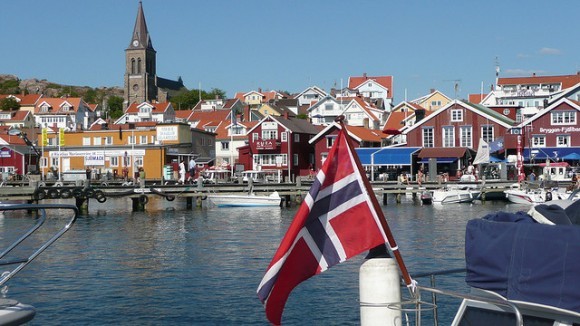 This guest post is by Tor Grønsund, a Norwegian entrepreneur, educator, speaker, and writer of the The Methodologist blog on startup innovation. Follow him on Twitter @tor
This guest post is by Tor Grønsund, a Norwegian entrepreneur, educator, speaker, and writer of the The Methodologist blog on startup innovation. Follow him on Twitter @tor
For the better or the worse, the Norwegian startup scene finally has some heat. Although TechCrunch’s harsh take on Norway’s startup state sparked some longed for discussion (or lack thereof), the picture painted needs to be nuanced.
Nevermind the research
Mike Butcher compares the ones of Spotify, Rovio, Tradeshift, and Everbread to the lack of evidence of successful startups from Norway, even pondering upon Opera as a half-fledged success. The arguments are as half the truth as pointing at two startups, Bipper and Wonderloop as examples of the opposite.
Only days prior to TechCrunch’s butchering of Norway’s startup climate, TC’s own Sarah Perez reported that Norwegian startup WeVideo, a cloud-based collaborative video-editing platform, had raised $19.1M from VC’s in the US.
The week before TechCrunch published an article about Soundrop, another promising Norwegian startup that builds a social layer on top of Spotify, allowing users to create listening-rooms with their existing Spotify playlists.
News about Fribi, a mobile-local marketplace that allows you to sell and trade your unwanted belongings, had just been chosen by VentureBeat to launch at the DEMO didn’t seem to be worthy a mention either. Ironically, the founders of Fribi had approached TC (with direct emails to Butcher) to write about their startup – only to see how bad things are in Norway a couple of days later.
And as late as this week TechCrunch reported that bMobilized had acquired funding from two Norwegian VC firms.
Add to this that five Norwegian companies went to the finals of the Red Herring 2012 Europe Award, and it seems to me that the outcome of a rant about the state of the Norwegian startup scene might as well have been of positive sentiment.
Of course Norwegians take their startups elsewhere
“It appears Innovation Norway [the government’s investment arm] is not well connected to the international tech scene”, the article says. That requires a more throughout look.
Consider San Francisco-based DoubleTwist, which Norwegian co-founder acquired funding from Northzone and Index Ventures. Flattr is co-founded by the Norwegian co-founder of The Pirate Bay and is headquartered in Sweden. WooThemes and its Norwegian co-founder are virtually global. Attentio, by the founder of Zoomit, (later Kelkoo/Yahoo) is based in Brussels. Gauss was started by the co-founder of Plone and operates out of Cologne. Maybe not yet media darlings, but they are Norwegian founders eventually bringing home inevitable experience.
So it seems that Norway isn’t that disconnected to the international tech scene after all.
Playfish, co-founded by a Norwegian and operating offices in Tromsø, was acquired by EA for $400M. TrollTech, Funcom, NimSoft, Chipcon, and Falanx, to mention some, all had their exits. The former founder of FAST recently founded cXense. CFengine serves clients such as Facebook, Google, Cisco, and AT&T. Meltwater should need no further introduction — all once startups and international at large. TC’s article taken into account, in a culture that doesn’t recognize success, there is no success.
There may be many reasons for Norwegians taking their startups elsewhere, for instance high tax rates or a small home market, but international presence is still a step in the right direction. Even textbook entrepreneurial thinking tells founders to go where customers are, so why should they not? The million-dollar question is if Norway can make startup migration sustainable.
Norway’s tech scene is blooming
Norwegian entrepreneurs put a huge amount of efforts into their startups, and their stories deserve to be told as often as any. The new generation is about to find its voice.
BetaFactory, a startup accelerator based on the TechStars model that was launched this year, has a promising portfolio and is doing a great job of plugging experienced mentors across industries into the early-stage entrepreneurial ecosystem.
Pioneers at Startup Norway keep taking Startup Weekend to the next level and are networking around the clock. StartupSummer, another two-week startup program already had great success last year.
MESH provides space to a new generation businesses and keep throwing popular startup events. They even sold a membership to Norway’s current Minister of Trade and Industry.
Innovation Norway launched Innovation House, a co-working space and incubator program located downtown Palo Alto, to help Norwegian startups make it overseas.
Applications to the Norwegian Entrepreneurship School are all-time high as they continue to send aspiring entrepreneurs to startup hubs around the world.
There might be some truth in saying that “Norway is losing the battle to take its place in the fast-paced Nordic tech scene” in terms of size. But signs are that Norway’s startup scene is growing up at speed.
The dilemma of governmental grants
Unfortunately governmental funding has become a “sleeping pillow” to many aspiring entrepreneurs. Instead of hunting customers, too many founders put their efforts and existence in chasing governmental grants. Subsidies do not make a startup, customers do. And with customers comes funding.
Whether migration or displaced success is due to culture, legislations, tax policies, the infamous Jante Law, oil bonanza, a small home market, or access to the right capital – founders targeting international markets and getting down with real customers might be exactly what the Norwegian startup scene needs.
PS: For the CrunchBase stats I’d be happy to donate this list of Norwegian startups. The question is, is anyone at TechCrunch listening?
—
Top image CC licensed by peterporto on Flickr.




